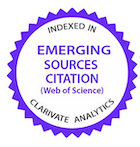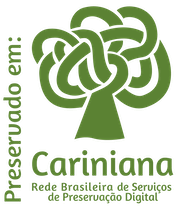Afluentes da veia porta-hepática no avestruz (Struthio camelus)
DOI:
https://doi.org/10.1590/1809-6891v21e-57074Resumo
O avestruz (Struthio camelus, Linnaeus 1758) é a maior ave do mundo, com uma importância comercial acentuada na África e expandindo-se para diversos países. Assim, com o desenvolvimento dos sistemas de criação, tornam-se necessários estudos morfológicos que subsidiem as áreas aplicadas, pois a espécie apresenta características anatômicas próprias. O objetivo deste estudo foi a descrição dos principais afluentes da veia porta-hepática nesta espécie. Para a realização do presente trabalho, foram utilizadas dez vísceras de animais adultos, de ambos os sexos, que foram injetados com Neoprene látex por meio da veia porta-hepática para evidenciar os seus afluentes. Após a repleção vascular, os animais foram fixados e conservados em solução aquosa de formaldeído a 10%. O sistema porta-hepático foi dissecado e fotodocumentado. Observou-se que a veia porta-hepática esquerda recebe sangue da região do proventrículo e ventrículo gástrico. A veia porta-hepática direita é a responsável pela drenagem do sangue nos seguintes órgãos: baço, por meio da veia proventriculoesplênica, pâncreas, pela veia pancreaticoduonais, jejuno, por meio do tronco jejunal, e o cólon, que forma a veia mesentérica cranial.
Palavras-chave: Veia porta-hepática; Drenagem venosa; Struthio camelus.
Downloads
Referências
Williams JB, Siegfried WR, Milton SJ, Adams NJ, Dean WRJ, du Plessis MA, Jackson, S. Field metabolism, water requirements, and foraging behavior of wild ostriches in the Namib. Ecology. 1993; 74(2): 390-404.
Cooper SM, Palmer T. Observations on the dietary choice of free-ranging juvenile ostriches. Ostrich. 1994; 65(3-4), 251-255.
Milton SJ, Dean WRJ, Siegfried WR. Food selection by ostrich in Southern Africa. Journal of Wildlife Management. 1994; 58:234-248.
Frei S, Ortmann S, Reutlinger C, Kreuzer M, Hatt JM, Clauss M. Comparative digesta retention patterns in ratites. The Auk: Ornithological Advances. 2015;132(1): 119-131.
Skadhauge E, Warüi CN, Kamau JMZ, Maloiy GMO. Function of the lower intestine and osmoregulation in the ostrich: preliminary anatomical and physiological observations. Quarterly Journal of Experimental Physiology: Translation and Integration. 1984; 69(4): 809-818.
Hongo A, Ishii Y, Suzuta H, Enkhee D, Toukura Y, Hanada M, Hidaka S, Miyoshi S. Position and rate of intestinal fermentation in adult ostrich evaluated by volatile fatty acid. Research Bulletin of Obihiro University. 2006; 27(9):93-97.
Cho P, Brown R, Anderson M. Comparative gross anatomy of ratites. Zoo Biology. 1984; 3 (2):133-144
Herd RM & Dawson TJ. Fiber digestion in the emu, Dromaius novaehollandiae, a large bird with a simple gut and high rates of passage. Physiological Zoology. 1984; 57(1):70-84.
Jamroz D. The digestion of the structural substances in Ratitae and in other species of poultry. Proceedings International Ostrich Symposium, Current Problems in Ostrich Keeping, 29-30 September 2000, pp. 39-41. Polish Academy of Sciences, Mrokow.
Moore SJ. Food breakdown in an avian herbivore: Who needs teeth? Australian Journal of Zoology. 1999; 47(6):625-632.
Fritz J, Hummel J, Kienzle E, Wings O, Streich WJ, Clauss M. Gizzard vs. teeth, it’s a tie: food-processing efficiency in herbivorous birds and mammals and implications for dinosaur feeding strategies. Paleobiology. 2011; 37(4), 577-586.
Pavaux CL & Jolly A. Note on the vasculo-canalicular structure of the liver of domestic birds. Revue Med. 1968; 119(5):445-466.
Pinto MRA, Ribeiro AACM, Souza WM, Miglino MA, Machado MRF. Study of the liver portal system in the domestic duck (Cairina moschata). Brazilian Journal of Veterinary Research and Animal Science. 1999; 36(4): 173-177.
Santos TC, Ferrari CC, Menconi A, Maia MO, Bombonato PP, Pereira CCH Veins from hepatic portal vein system in domestic geese. Pesquisa Veterinária Brasileira. 2009; 29(4):327-332.
Tolba AR. Gross anatomical study on the hepatic portal vein tributaries in the common domestic pigeon (Columba livia domestica). International Journal of Veterinary Science. 2015; 4(2): 63-68.
Khalifa EF, Daghash SM Gross anatomical study on the tributaries of the hepatic portal vein in cattle egret (Bubulcus Ibis). Veterinary Medical Journal-Giza (VMJG). 2014; 60(2): 75-90.
Oliveira D. Heart and blood vessels of birds. In: Getty, R. Sisson/ Grossman. Anatomy of Domestic Animals. 6th ed. Rio de Janeiro: Guanabara Koogan; 1959, p.1842-1880.
Malinovsky L. A contribution to the comparative anatomy of vessels in the abdominal part of the body cavity in birds. I. Blood supply to stomachs and adjacent organs in buzzard (Buteo buteo L.). Folia morfológica. 1965; 13, 191-201.
Nickel R, Schummer A, Seiferle E. Anatomy of the domestic birds. 1st ed. Berlin: Verlag Paul Parey. 1977; p. 96-99; 101-103.
Cury FS, Censoni JB, Ambrose EC. Anatomical techniques in teaching the practice of animal anatomy. Pesquisa Veterinária Brasileira. 2013; 33(5): 688-696.
Baumel JJ, King AS, Lucas AM, Breazile JE, Evans HE Nomina Anatomica Avium: An annoted anatomical dictionary of birds. Academic Press, London. 1979.
El karmoty AF. Macromorphological study on the digestive system of geese and ducks with special reference to its blood supply. Ph.D. Thesis. Faculty of Veterinary Medicine, Cairo University, 2014.
Jiaji C. The hepatic portal venous system of fowl. Chinese journal of veterinary science. 1997; 16: 01-06.
Nishida T, Paik YK, Yasuda M. Blood vascular supply of the glandular stomach (ventriculus glandularis) and the muscular stomach (ventriculus muscularis). Nihon Juigaku Zasshi, 1969; 31: 51-70.
Bezuidenhout AJ. The topography of the thoraco-abdominal viscera in the ostrich (Struthio camelus). Onderstepoort Journal of Veterinary Research. 1986; 53 (2): 111-117.
Maher MA. Descriptive anatomy of hepatic and portal veins with special reference to biliary duct system in broiler chickens (Gallus gallus domesticus): A Recent Illustration. Brazilian Journal of Poultry Science, 2019; 21 (2): 2019.
Downloads
Publicado
Como Citar
Edição
Seção
Licença
Copyright (c) 2020 Ciência Animal Brasileira

Este trabalho está licenciado sob uma licença Creative Commons Attribution 4.0 International License.
Autores que publicam nesta revista concordam com os seguintes termos:
- Autores mantém os direitos autorais e concedem à revista o direito de primeira publicação, com o trabalho simultaneamente licenciado sob a Licença Creative Commons Attribution que permite o compartilhamento do trabalho com reconhecimento da autoria e publicação inicial nesta revista.
- Autores têm autorização para assumir contratos adicionais separadamente, para distribuição não-exclusiva da versão do trabalho publicada nesta revista (ex.: publicar em repositório institucional ou como capítulo de livro), com reconhecimento de autoria e publicação inicial nesta revista.
- Autores têm permissão e são estimulados a publicar e distribuir seu trabalho online (ex.: em repositórios institucionais ou na sua página pessoal) a qualquer ponto antes ou durante o processo editorial, já que isso pode gerar alterações produtivas, bem como aumentar o impacto e a citação do trabalho publicado (Veja O Efeito do Acesso Livre).






























